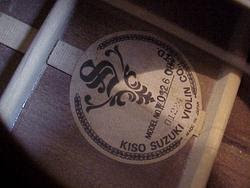Kiso Suzuki Guitar Serial Numbers
Posted By admin On 09.09.19Mondayn sufmonth of the year, used after number or question word e. Ruuna, Raito, Yue, Yui, Meguru, Mu n, Mitsuki, Madoka, Hikaru, Tsukizaki, Tsuki, Takagetsu, Arute, Aporo, Akari, Runa. Go board game of capturing territory41. Nihon Kiin, central Go organization of Japan. DSCN4944.jpg' alt='Kiso Suzuki Guitar Serial.
Kiso Suzuki is the name of a now-defunct guitar company from the Kisofukushima region of Japan. This region is well known for it's mountains and trees, and the lure of the region with it's valuable lumber brought craftsman to the area - one such interest was, of course, guitar-making.Kiso Suzuki and Nagoya Suzuki were one company before the war - a 3-factory company started by Masakichi Suzuki that produced the well-known 'Suzuki Violin' violins. But after the war the company was split up into the Suzuki Violin Company (now Kiso Suzuki Violin Company) and Suzuki Violin Manufacturing Company (now Nagoya Suzuki Violin Company). And there the relationship ended.). Re: the serial number: on many of the models the first one or two numbers in the serial number stands for the year in which it was manufactured; from the 60’s to the 80’s.
I have never seen a definite 1950's guitar yet, mainly because I don't know enough about them yet.The other prefixes/suffixes.W, C, S, VS, D, G, A, T, R, O, J.may follow other common meanings. W = Western model F= Folk Model C= Cutaway E=Electronics K=? S=Spruce (top) VS= Violin Sunburst color D=Dreadnaught shape G=Grand Concert shape for classicals; some 'G' acoustics however had a Gallagher type headstock A=? Takeharu sometimes R=?
J=Jumbo shape (if you can help with understanding their system, please DO write me at suzukiguitars@gmail.com.Thanks!). 'I have a Suzuki, but it doesn't sound as good as I had hoped for.' If you have a Suzuki that doesn't sound so great. Not every Suzuki guitar is equal to an 'inheritance' guitar. But, some are. Some may just require a setup to sound better; others may be too heavily built or have intonation problems (personal experience with some steel strings built by Kiso).
BUT, it's possible to fix some of these problems and have your guitar sound a lot better. Also, different years, different labels (jobbers?), and whether the guitar was intended for export or for Japan - seems to have made a difference. Some woods used were Linden, Rosewood, Maple, Ovangkol, and Nato. Spruce and Cedar were used for the tops – usually laminated for the overseas market, as laminates don’t readily crack, but some models are solid tops. There is a popular theory about solid tops sounding better, but there is disagreement on this matter by some well-respected people. See the website.
Suzuki laminates were generally very good quality, and many people feel their guitars, even though laminated, sound better than many solid tops. Suzuki craftsmanship surely played a role in the sound too. The numbering system is usually tied in with the price. An F100 would have been 10,000 yen, an F130 would have been 13,000 yen, an W250 would have been 25,000 yen and so on. But some models are lower numbers yet very ornamented, so it doesn’t seem like this always holds true. (see the F35 scrollwork on the fretboard). One interesting thing that stands out is the change in labels.
If you’ll notice, there were a few different labels. Were there different divisions or contract manufacturers? I don’t know at this time. There are thousands of players worldwide who would like to know more about their Kiso Suzuki guitar.
It's a common story that when someone has G.A.S (Guitar Acquisition Syndrome) and needs to let a guitar or two go, the Suzuki is the one that stays behind and can't be replaced. If you own a Kiso Suzuki guitar - congratulations on what you probably already know - that you own a well-crafted and good sounding instrument.
One that is still undervalued in the opinion of many players. Maybe you'll hang on to it and see that there is something special about many of their instruments.
Kiso Suzuki Guitar Serial Numbers

In any case, as Tetsu said.' Have a nice life with Suzuki guitar.”.